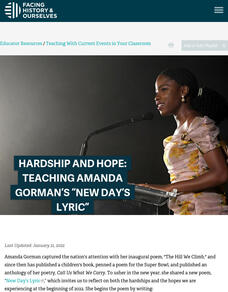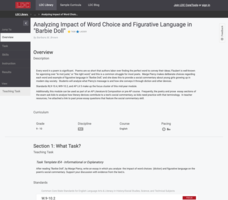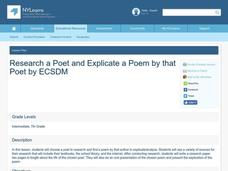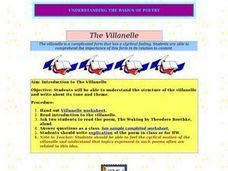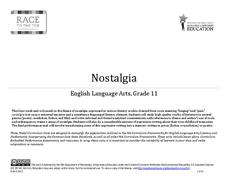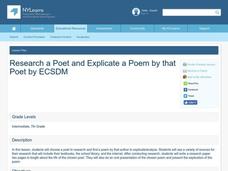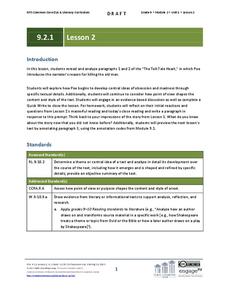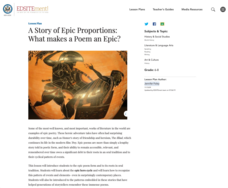Facing History and Ourselves
Hardship and Hope: Teaching Amanda Gorman's "New Day's Lyric"
Class members come together to study Amanda Gorman's poem "New Day's Lyric." After a close reading of the poem, learners watch a video of Gorman reading her poem, and then craft additional lines for the poem where they offer suggestions...
Literacy Design Collaborative
Analyzing Impact of Word Choice and Figurative Language in "Barbie Doll"
After a close reading Marge Piercy's poem "Barbie Doll," class members craft an AP®-style explanatory essay in which they analyze the diction and other figurative literary devices the poet employs to deliver her commentary on modern...
Curated OER
A Voice for Hard Issues
Ouch! The final lesson plan in the 12-resource poetry unit models for young writers how poems can be used to voice hard truths.
EngageNY
Analyzing Character: Who is Lyddie?
Character analysis can help readers feel more connected to a literary text. Scholars explore the topic by writing an acrostic poem about the main character from Katherine Paterson's novel, Lyddie. Then, pupils watch a short video to help...
Curated OER
Exploring Contrasts in "The Lanyard" by Billy Collins
Middle schoolers analyze the speaker's ideas and tone in the Billy Collins poem "The Lanyard." After identifying how each of the five senses is addressed in the poem, they compare images to draw conclusions about the speaker and his...
Curated OER
Research a Poet and Explicate a Poem by that Poet
Seventh graders choose a poet to research and find a poem by that author to explicate/analyze using a variety of sources for their research that will include their textbooks, the school library, and the internet. After conducting...
Curated OER
Edward Lear, Limericks, and Nonsense
Introduce your class to the delights of nonsense poetry and explore literary devices with the writing of Edward Lear. Learners identify rhyme and meter as well as figures of speech, alliteration, and onomatopoeia in "The Owl and the...
Curated OER
Louisiana's Tragic Hero - "Evangeline"
"Ye who believe...List to a Tale of Love in Acadie." Longfellow's epic poem, "Evangeline," launches a study of tragic heroines, epic poetry, the expulsion of the Acadians from Canada, and their subsequent migration to Louisiana. The...
Curated OER
The New England Fishing Industry:Sea Changes in a Community
Explore New England's economic and cultural past and possible issues New Englanders will face in the future. Middle and high schoolers research the fishing industry and the need for regulation. They analyze the topography of New England...
Curated OER
The Villanelle
Students analyze the structure of the villanelle and write about its tone and theme. In this villanelle lesson, students complete a villanelle worksheet and read an introduction to the villanelle. Students read 'The Waking' by Theodore...
Massachusetts Department of Education
Nostalgia
To prepare for crafting their own memoir, class members examine poetry by Margaret Atwood, Billy Collins, Robert Hayden, and Claude McKay, stories by Richard Rodriquez and Willa Cather, and Barry Levinson's film Avalon. They examine...
Lafayette Parrish School System
Teaching Tone and Mood
Tone and Mood are not synonymous! Introduce young readers to these literary devices with a series of exercises that not only point out the significant differences between the terms but also shows them how to identify both the tone and...
Curated OER
Research a Poet and Explicate a Poem by that Poet
Using your school's media center, internet research, and a SMART board, 7th graders research a chosen poet and write a research report. Additionally, 7th graders explicate one poem by the poet within their report. Several resource links...
Curated OER
Sor Juana, la monja y la escritora: Las Redondillas y La Respuesta
Sor Juana, considered one of the first feminist writers and a great Latin American poet, is the topic and inspiration for this excellent lesson plan. Use the introduction, guiding questions, and learning objectives to lead your class...
Maryland Department of Education
The Concept of Diversity in World Literature Lesson 12: Author's Purpose - Yeats and Achebe
Is there such a thing as fate/luck? Can one fight destiny? As part of their study of Chinua Achebe's purpose in writing Things Fall Apart, class members answer these questions from Achebe's point of view and then from William...
EngageNY
Grade 9 ELA Module 2: Unit 1, Lesson 2
Make up your mind to complete a lesson plan about "The Tell-Tale Heart" and forever rid yourself of simple sentence structures. As ninth graders analyze the first two paragraphs of Edgar Allan Poe's short story, they consider how text...
Curated OER
Rock and Poetry: A Thematic Project
Students become exposed to British poetry. They identify and discuss the thematic connection between a poem and a song of their choice, and enrich their understanding of poetry through an in-depth analysis of literary devices in the song...
National Endowment for the Humanities
Responding to Emily Dickinson: Poetic Analysis
Learners explore Emily Dickinson's poem "Safe in Their Alabaster Chambers." In this Dickinson poem instructional activity, students analyze the poem as proof of Dickinson' awareness of her reader. Learners analyze her style and identify...
National Endowment for the Humanities
The Impact of a Poem's Line Breaks: Enjambment and Gwendolyn Brooks' "We Real Cool"
Young scholars analyze the Gwendolyn Brooks use of enjambment in her poem "We Real Cool." For this poetry analysis activity, students define common poetic devices and the examples of enjambment in the poem. Young scholars discuss the...
National Endowment for the Humanities
A Story of Epic Proportions: What Makes a Poem an Epic?
Learners analyze the epic poem form and its roots in oral tradition. For this epic poetry lesson, students research the epic hero cycle and recognize the pattern of events and elements. Learners analyze the patterns embedded in the stories.
Curated OER
My Life had stood – a Loaded Gun – Theme of Gender
In this poetry analysis learning exercise, students read a reflection on the conflict between male and female identities in Dickinson's "My Life had stood – a Loaded Gun –." Students then respond to questions about male and female...
Curated OER
My Last Duchess Theme of Jealousy
In this poetry analysis worksheet, students examine commentary about the jealousy of the Duke in Browning's "My Last Duchess." Students respond to discussion questions regarding the Duke’s suspicion that his wife is unfaithful, his...
Curated OER
Death in Poetry: A.E. Housman's "To an Athlete Dying Young" and Dylan Thomas' "Do Not Go Gentle into That Good Night"
Students analyze poems about death. In this poetry analysis lesson, students read poems from both Dylan Thomas and A.E. Housman and analyze them in groups for common poetic devices. Students present their analysis and complete a Venn...
Curated OER
The Lady of Shalott: Theme of Man and the Natural World
Students read about Alfred, Lord Tennyson's use of nature in the poem, "The Lady of Shallot." Students then respond to 4 short answer questions based on the theme of man in the natural world. Questions require students to reflect...
